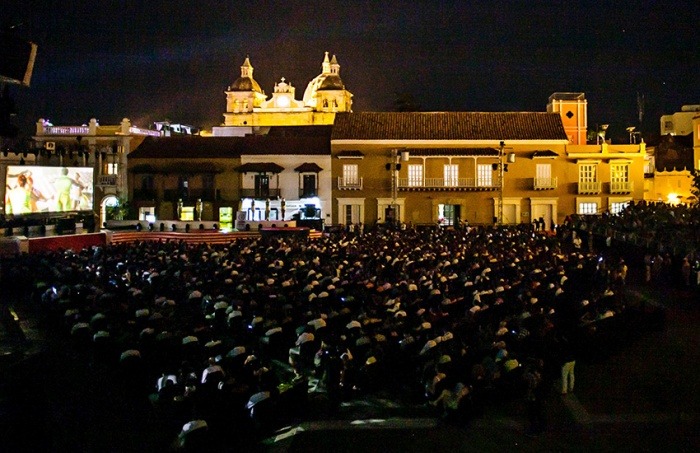
“Morro dos Prazeres” opens with a group of kids playing a kind of backwards version of cops and robbers. Here, it’s the robbers that go after the cops and once they catch them, force them to kneel down and rough them up, whacking them about the face with training guns made out of cardboard.
The Brazilian documentary purports to tell the story of UPPs, Rio de Janeiro’s ongoing police program to wrest control of some of the city’s more than 1,000 “favela” hillside slums from the drug dealing gangs that long ruled there.
Begun in 2008, the program sees police battalions storm into the slums in the early morning, pushing the armed gangs out and setting up permanent police stations in areas where the state had been completely absent for decades and the gangs had long doled out their own brutal justice through the barrel of a gun. The sprawling seaside metropolis now has 38 pacifying police stations that cover 257 slums.
The pacifying police arrived in the Prazeres favela in 2011, as part of the state government’s push to take over slums that dot the city high-rent beachfront neighborhoods as well as the historic downtown before the city plays host to the World Cup this June and the Summer Olympics in 2016.
The dawn take-overs have tended to go down pacifically; the government announces the date of the occupation beforehand and the drug gangs move on to other nearby slums well ahead of time, resulting in take-overs where rarely a shot is fired. But still, the raids produce dramatic images: Brazilian and foreign media have gone to town with footage of slumdwellers cowering inside their shacks as heavily-armed police in full body army surge through the labyrinthine favelas.
Curiously, “Morro dos Prazers,” or “Hill of Pleasures,” by Brazilian director Maria Ramos doesn’t include any shots of the occupation. The movie instead follows a police commander as he attempts to mediate between the hostile locals and skittish officers – most of them young, mixed-race or black and from favelas like Prazeres.
He cajoles a local woman who comes to report the robbery of her son’s tennis shoes, telling her than unless she turns in neighbors she knows are involved in drug trafficking, such robberies will continue unchecked. He tells a party producer that his baile funk, raucous dance parties that normally last till dawn, will have to wrap up at midnight.
In a training session, he warns the new recruits, “Don’t take the same paths because the traffickers are observing you and waiting for the right moment to ambush.” The recruits exchange nervous glances.
Then the camera shifts positions and we see the ones on the receiving end of the police pacification: Shirtless young men who are stopped and frisked for no apparent reason, the officers rifling though the pockets of their board shorts for drugs or guns.
The camera trails a series of characters – a book seller, a postman, a reformed drug dealer – through the maze of narrow lanes, stairs and passageways that make up the favela. There’s no discernable storyline, and it never becomes clear why those particular subjects were chosen, nor what, if anything, they have to do with one another.
Without either interviews or voice-overs to provide a little context on these people, the only things we know about them are what we overhear in their dialogues with friends, family and the police. That’s a shame because there are characters that deserve closer observation, particularly the teen convicted on drug charges who turns out to be a lesbian.
With her shaved head, deep voice and uniform of board shorts and flip flops, she looks and sounds like a man, and her gender only becomes clear during her trial.“Let this be a warning to you, miss,” says the judge, and it takes the viewer a beat to figure out who she’s addressing.
Later we see the character making out with her girlfriend at a baile funk – gun-slinging dance parties often organized by gangs and generally regarded as hotbeds of homophobia. And yet the film never addresses her homosexuality, nor does it explore the very particular struggle of being gay and out in a favela.
Ultimately, “Morro dos Prazeres” comes off as a good opportunity lost. While the images are nice– shot with a steadycam instead of the wildly-pitching handheld cameras normally favored for such projects – there’s just not enough in the way of a narrative binding the scenes together.
Is the movie trying to make a political statement about the pacifying police project, which has come under fire in recent months after a series of high profile police killings of slumdwellers? It’s not clear. While we hear a litany of complaints about the police by local residents, the film lacks the structure to turn those grumblings in to a cohesive argument.
In the end, “Morro dos Prazeres” is more like an aimless stroll through the Hill of Pleasures.
“Salsa es passion” proclaims the website of Crazy Salsa, a dance school in Cartagena. The school is one of dozens of establishments promising to “enhance the body awareness” of foreign tourists who flock to Colombia’s subtropical salsa capital by the sea hoping to come away with more than a sunburn and a Panama hat. On Crazy Salsa’s site students can hand-pick their instructors from a gallery of photos of doe eyed mulatas staring down the camera with come-hither looks. But not all the instructors for hire are women. There are also a handful of strapping male specimens from which to choose. For my longer story I propose to explore the lives of Cargagena’s male salsa instructors, who spend their nights getting their toes trampled upon by… robust German madchens? By bulky Italian gym bunnies?
First of all we try to sensibilize and train you for the moves which make latin dancing such a pleasure, to enhance you body awareness and to get the different rhythms in your feet and heart.
